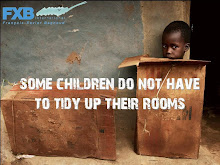Through researching for and maintaining this website, I have come across many helpful and educational websites. While this month's focus has been World Hunger, especially in Haiti, I have found the website hosted by World Food Programme to be one of the most helpful sites. I have learned more about world hunger, have discovered ways to fight world hunger, and have found additional links to other helpful sites. I have only scratched the surface of this organization and website. Another one of my new favorite websites is One.org, which has also highlighted World Food Programme.
Malnourishment at http://www.wfp.org/hunger/malnutrition
"A malnourished person finds that their body struggles to do normal things such as grow and resist disease. Physical work becomes very difficult and even learning abilities can be diminished. For women, pregnancy becomes risky and they cannot be sure of producing nourishing breast milk.
When a person is not getting enough food or not getting the right sort of food, malnutrition is just around the corner. Disease is often a factor, either as a result or contributing cause. Even if people get enough to eat, they will become malnourished if the food they eat does not provide the proper amounts of micronutrients - vitamins and minerals - to meet daily nutritional requirements.
Malnutrition is the largest single contributor to disease, according to the UN's Standing Committee on Nutrition (SCN).
Malnutrition at an early age leads to reduced physical and mental development during childhood. Stunting, for example, affects more than 147 million pre-schoolers in developing countries, according to SCN's World Nutrition Situation 5th report. Iodine deficiency, the same report shows, is the world's greatest single cause of mental retardation and brain damage.
Undernutrition affects school performance and studies have shown it often leads to a lower income as an adult. It also causes women to give birth to low birth-weight babies.
Window of opportunity
The first two years of life are the “window of opportunity” to prevent early childhood undernutrition that causes largely irreversible damage. WFP focuses on the earliest phase of life, i.e. from conception (-9 months) to 24 months of age, providing essential nutrients including vitamins and minerals.
Eliminating malnutrition involves sustaining the quality and quantity of food a person eats, as well as adequate health care and a healthy environment. WFP helps fight malnutrition by treating it -- giving malnourished people the food and nutrients they need -- but also by preventing it.
Tuesday, February 16, 2010
Malnourishment by World Food Programme
Posted by The Power of One at 6:47 PM
Labels: malnourishment, vastness of world hunger, World Food Programme
Subscribe to:
Post Comments (Atom)


.jpg)





1 comments:
Maybe the United States government could take the money they spend on $800 hammers, $650 toilet seat covers, or $3125 doors for buildings, and send it over there.
Post a Comment